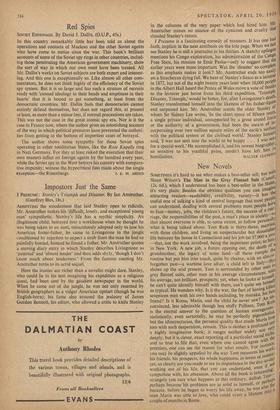Impostors Just the Same
I PRESUME: Stanley's Triumph and Disaster. By Ian Anstruther. (Geoffrey Bles, 18s.)
ADMITTING the woodenness that laid Stanley open to ridicule, Mr. Anstruther makes his 'difficult, lonely, and exceptional young man' sympathetic. Stanley's life has a mythic simplicity. An illegitimate child, betrayed into a workhouse when he thought he was being taken to an aunt, miraculously adopted only to lose his American foster-father, he came to Livingstone in the jungle conditioned by rejection to expect a snub from the man he had so painfully hunted. Instead he found a father. Mr. Anstruther quotes a moving diary entry in which Stanley describes Livingstone as 'paternal' and 'almost tender' and then adds shyly, 'though I don't know much about tenderness.' From the famous meeting Mr. Anstruther turns to its acrid sequel.
Here the ironies are richer than a novelist might dare. Stanley, who could lie in his tent imagining his expedition as a religious quest, had been sent by the gaudiest newspaper in the world. When he came out of the jungle, he was not only resented by British geographers as a vulgar American upstart (though he was English-born); his fame also aroused the jealousy of James Gordon Bennett, his editor, who allowed a critic to knife Stanley
SPECTATOR, APRIL 20, 1956 in the columns of the very paper which had hired him. Mr. Anstruther misses no nuance of the cynicism and cruelty that clouded Stanley's return. I Presume is a fascinating comedy of manners. It has one bad fault, implicit in the neat antithesis on the title page. When we last see Stanley he is still a journalist in his thirties. A sketchy epilogue mentions his Congo exploration, his administration of the Congo Free State, his mission to Emir Pasha—only to suggest that the earlier years were more important. Was the 'disaster' so comPle.ie as this emphasis makes it look? Mr. Anstruther ends too easily on a Stracheyan dying fall. We hear of Stanley's fiasco as a lecturer in 1872, but not of the night twenty years later when 10,000 people in the Albert Hall heard the Prince of Wales move a vote of thanks to the lecturer just home from his third expedition. `Triumph, Disaster, Triumph,' would be better, for, after Livingstone's death' Stanley transformed himself into the likeness of 'his father-figure and surpassed him. Mr. Anstruther scants the older Stanley 01 whom Sir Sidney Lee wrote, 'In the short space of fifteen Years' a single private individual, unsupported by a great armed force or the authority of a government, had been the means of in- corporating over two million square miles of the earth's surface, with the political system of the civilised world.' Stanley himself said, 'I was not sent into the world to be happy . . . I was sent, for a special work.' He accomplished it, and his newest biographer, so sensitive to his youthful pains, needn't have left. him in


















































 Previous page
Previous page